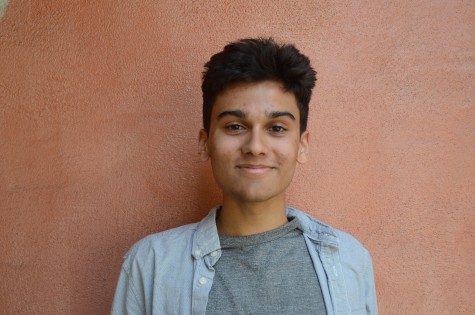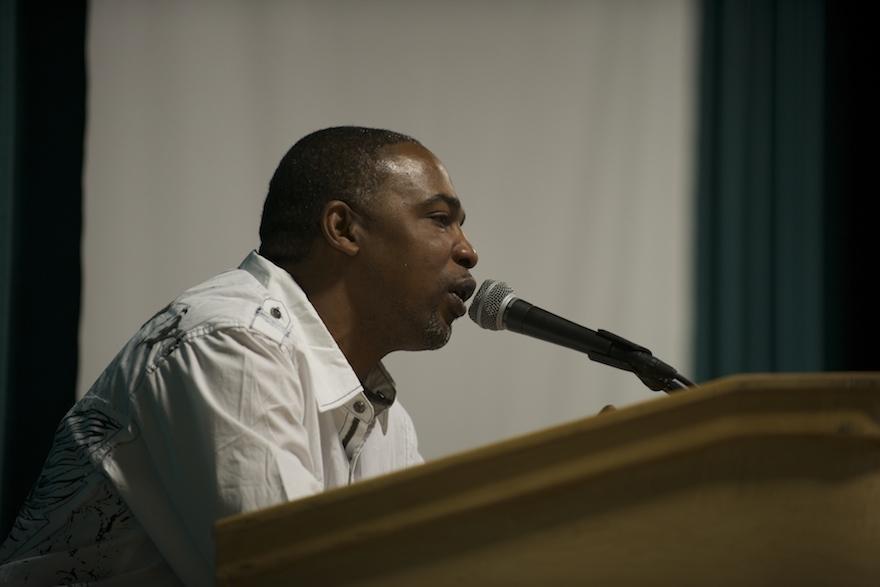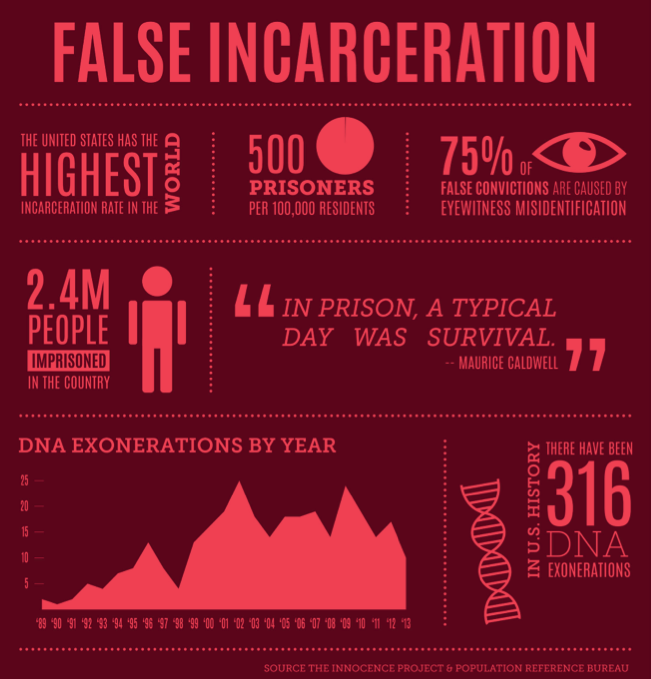Exoneree speaks out about prison and justice system
Maurice Caldwell addresses the student body at a school assembly on April 15.
The Northern California branch of the Innocence Project, accompanied by one of its exonerees, Maurice Caldwell, came to the Upper School on April 15 to address the student body about the criminal justice system and false incarceration.
Maurice Caldwell spent more than twenty years in jail for a crime that he did not commit. With the help of the Innocence Project, a national litigation and public policy organization that campaigns for reforms of the criminal justice system in order to exonerate wrongfully convicted individuals, he was able to regain his life as a free man.
The Innocence Project on its website lists eyewitness misidentification, false confessions, jailhouse snitches, improper science, government misconduct, and bad lawyering as the prime causes for false convictions in the United States.
In Caldwell’s case, an error occurred with eyewitness misidentification, which according to the Innocence Project’s website is the “single greatest cause of wrongful convictions nationwide, playing a role in more than 75% of convictions overturned through DNA testing.”
“I wanted to maintain my sanity and continue to fight. I was in there to fight to get back,” Caldwell said in a phone interview with The Winged Post. “It took a lot out of me, because I never thought that I would be in a position like this, to fight for my freedom. I used to think that if you did a crime you would do the time. Not that you would do the time for a crime that you didn’t commit.”
His life has been changed irrevocably because of the experience, and Caldwell has undergone alterations to his psychological outlook on life as well as his goals for the future because of his time spent in jail for a crime that he did not perpetrate. Caldwell’s relationships with people around him have not been the same, according to him.
“I don’t trust people, and I’m very cautious about the people I deal with,” he said. “After all that time, there’s a lot of people that I really don’t know. When you sit there for so many years for a crime you didn’t do, your trust goes out the window.”
Caldwell spoke at length about the psychological effects of being incarcerated for a crime he did not commit.
“There is nothing positive about the prison system,” he said. “It changed me a lot. I lived a secret life in there, I thought about what it would be like to get a second chance. You know how they say misery loves company? There’s a lot of miserable people down there, and they do things to make other people feel miserable.”
Caldwell came out of prison into a very different world. Many around him were unfamiliar, and those who were familiar were no longer around him.
“When I first went to prison, I wanted to pray that my family stays strong, that my family stays secure when I was fighting this,” he said. “Everything that I hoped and wished for, it was the opposite. I lost all my family and my brother was killed.”
He went on to give pointed advice to students considering careers concerning the criminal justice system.
“If you have a job, just do your job, and don’t be influenced by the next person. The next person that influences you may be the one to mess it up for everyone,” he said. “There are victims on both sides. I feel that district attorneys should look at both sides and let that be instead of looking at one side and going with one side.”
Caldwell remains steadfast in his beliefs of advocating for what is right.
“It’s all about standing for what you believe in,” he said. “When you fall behind people and you don’t stand up, everything crumbles and you don’t know who you can trust in and rely on.”
According to a Population Reference Bureau (PRB) study from August 2012, the United States still has the highest incarceration rate in the world.
This piece was originally published in the pages of The Winged Post on May 16, 2014.
Elisabeth Siegel (12) is the editor-in-chief of the Winged Post. This is her fourth year in Journalism, and she especially loves production nights and...

Juhi Gupta is the Multimedia Editor for Harker Aquila. She is a junior and has been part of the journalism program since her freshman year. Her position...

Shay Lari-Hosain (12) is the Editor-in-Chief and co-founder of Wingspan Magazine. Shay has interviewed 2013 Nobel Laureates, authors like Khaled Hosseini...


















![“[Building nerf blasters] became this outlet of creativity for me that hasn't been matched by anything else. The process [of] making a build complete to your desire is such a painstakingly difficult process, but I've had to learn from [the skills needed from] soldering to proper painting. There's so many different options for everything, if you think about it, it exists. The best part is [that] if it doesn't exist, you can build it yourself," Ishaan Parate said.](https://harkeraquila.com/wp-content/uploads/2022/08/DSC_8149-900x604.jpg)




![“When I came into high school, I was ready to be a follower. But DECA was a game changer for me. It helped me overcome my fear of public speaking, and it's played such a major role in who I've become today. To be able to successfully lead a chapter of 150 students, an officer team and be one of the upperclassmen I once really admired is something I'm [really] proud of,” Anvitha Tummala ('21) said.](https://harkeraquila.com/wp-content/uploads/2021/07/Screen-Shot-2021-07-25-at-9.50.05-AM-900x594.png)







![“I think getting up in the morning and having a sense of purpose [is exciting]. I think without a certain amount of drive, life is kind of obsolete and mundane, and I think having that every single day is what makes each day unique and kind of makes life exciting,” Neymika Jain (12) said.](https://harkeraquila.com/wp-content/uploads/2017/06/Screen-Shot-2017-06-03-at-4.54.16-PM.png)








![“My slogan is ‘slow feet, don’t eat, and I’m hungry.’ You need to run fast to get where you are–you aren't going to get those championships if you aren't fast,” Angel Cervantes (12) said. “I want to do well in school on my tests and in track and win championships for my team. I live by that, [and] I can do that anywhere: in the classroom or on the field.”](https://harkeraquila.com/wp-content/uploads/2018/06/DSC5146-900x601.jpg)
![“[Volleyball has] taught me how to fall correctly, and another thing it taught is that you don’t have to be the best at something to be good at it. If you just hit the ball in a smart way, then it still scores points and you’re good at it. You could be a background player and still make a much bigger impact on the team than you would think,” Anya Gert (’20) said.](https://harkeraquila.com/wp-content/uploads/2020/06/AnnaGert_JinTuan_HoHPhotoEdited-600x900.jpeg)

![“I'm not nearly there yet, but [my confidence has] definitely been getting better since I was pretty shy and timid coming into Harker my freshman year. I know that there's a lot of people that are really confident in what they do, and I really admire them. Everyone's so driven and that has really pushed me to kind of try to find my own place in high school and be more confident,” Alyssa Huang (’20) said.](https://harkeraquila.com/wp-content/uploads/2020/06/AlyssaHuang_EmilyChen_HoHPhoto-900x749.jpeg)




